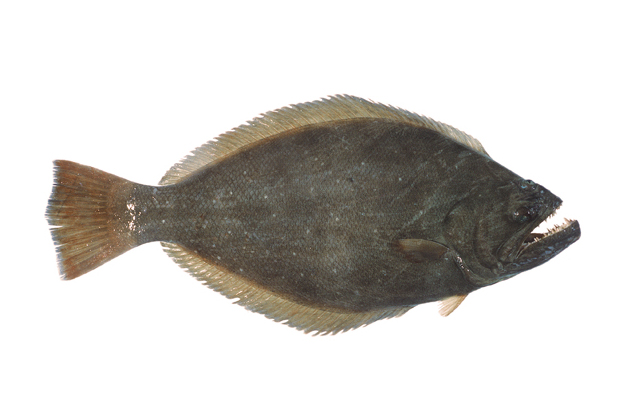Australian Halibut, Psettodes erumei (Bloch & Schneider 1801)
Other Names: Adalah, Flounder, Halibut, Indian Halibut, Queensland Halibut, Tropical Halibut

Australian Halibut, Psettodes erumei. Source: Australian National Fish Collection, CSIRO. License: CC By Attribution-NonCommercial
Summary:
A brown or greyish flatfish sometimes with four broad, dark bars across the upper side, a blackish margin on the dorsal, anal and caudal fins, and sometimes the blind side is partly pigmented. The mouth is large with numerous canine teeth in the jaws.
Cite this page as:
Bray, D.J. 2020, Psettodes erumei in Fishes of Australia, accessed 01 Jul 2025, https://fishesofaustralia.net.au/home/species/4677
Australian Halibut, Psettodes erumei (Bloch & Schneider 1801)
More Info
|
Distribution |
Mandurah, Western Australia, around the tropical north to Shoalwater Bay, Queensland. Elsewhere the species occurs in the Red Sea, Indo-west Pacific: East Africa, Madagascar, Mauritius (Mascarenes) and Persian Gulf east to the Philippines, north to southern Japan, south Australia. Inhabits muddy and sandy areas, usually buried in the substrate during the day. |
|
Features |
Dorsal fin IX-XI, 38-45; Anal fin I, 33-43; Vertebrae 23-25. Body oval, relatively deep; mouth large with strong teeth; maxillary extending well beyond hind edge of lower eye; both eyes on left or right side; upper eye lying immediately below dorsal margin of body; gill rakers not developed; lateral line almost straight. Dorsal-fin origin well posterior to eyes, anterior rays spinous. |
|
Feeding |
Feeds at night, mostly on bottom-living animals, especially fishes. |
|
Fisheries |
Taken as bycatch in northern prawn trawl fisheries in Australian waters, and fished commercially elsewhere in parts of its range. |
|
Species Citation |
Pleuronectes erumei Bloch & Schneider 1801, Systema Ichthyologiae Iconibus ex Illustratum: 150. Type locality: Tranquebar [as Tharangambadi], India. |
|
Author |
Bray, D.J. 2020 |
|
Resources |
Australian Halibut, Psettodes erumei (Bloch & Schneider 1801)
References
Allan, R. 2002. Australian Fish and How to Catch Them. Sydney : New Holland Publishers (Australia) 394 pp.
Allen, G.R. 1997. Marine Fishes of Tropical Australia and South-east Asia. Perth : Western Australian Museum 292 pp. 106 pls.
Allen, G.R. & Erdmann, M.V. 2012. Reef fishes of the East Indies. Perth : Tropical Reef Research 3 vols, 1260 pp.
Allen, G.R. & Swainston, R. 1988. The Marine Fishes of North-Western Australia. A field guide for anglers and divers. Perth, WA : Western Australian Museum vi 201 pp., 70 pls.
Bloch, M.E. & Schneider, J.G. 1801. Systema Ichthyologiae Iconibus ex Illustratum. Berlin 584 pp. 110 pls. See ref at BHL
Hensley, D.A. 2001. Psettodidae, Citharidae. pp. 3792-3798 in Carpenter, K.E. & Niem, T.H. (eds). The Living Marine Resources of the Western Central Pacific. FAO Species Identification Guide for Fisheries Purposes. Rome : FAO Vol. 6 pp. 3381-4218.
Kuiter R.W. & Tonozuka, T. 2001. Pictorial guide to Indonesian reef fishes. Part 3. Jawfishes - Sunfishes, Opistognathidae - Molidae. Melbourne : Zoonetics pp. 623–893.
Marshall, T.C. 1964. Fishes of the Great Barrier Reef and Coastal Waters of Queensland. Sydney : Angus & Robertson 566 pp. 136 pls.
Norman, J.R. 1934. A Systematic Monograph of the Flatfishes (Heterosomata) Psettodidae, Bothidae, Pleuronectidae. London : British Museum Vol. 1 459 pp. 317 figs.
Ramm, D.C., Pender, P.J., Willing, R.S. & Buckworth, R.C. 1990. Large-scale spatial patterns of abundance within the assemblage of fish caught by prawn trawlers in Northern Australian waters. Australian Journal of Marine and Freshwater Research 41(1): 79-95. https://doi.org/10.1071/MF9900079
Russell, B.C. & Houston, W. 1989. Offshore fishes of the Arafura Sea. The Beagle, Records of the Museums and Art Galleries of the Northern Territory 6(1): 69-84
Sainsbury, K.J., Kailola, P.J. & Leyland, G.G. 1984. Continental Shelf Fishes of Northern and North-Western Australia. Canberra : Fisheries Information Service 375 pp. figs & pls.


